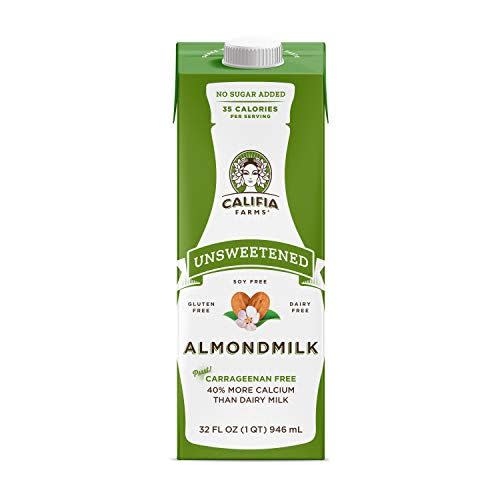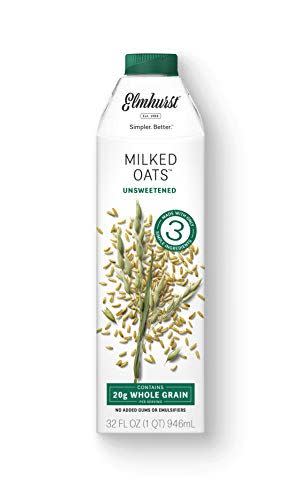These nutritionists solved the almond milk vs. oat milk debate
Gone are the days when your only non-dairy milk option was grabbing a carton of some good ol' almond milk.
Now there are countless nut milks and other plant-based alternatives (hiii, oat milk) taking over. Though almond milk held court as the king of dairy-free milk for years, its reign might be over. It looks like oat milk holds the title now, and that isn't a bad thing at all.
First of all, almond milk isn’t exactly sustainable. It takes a whopping 6,098 liters of water to produce a single liter of almond milk, according to the Sustainable Restaurant Association via The Guardian, which is extra troubling considering the U.S. gets most of its almonds from draught-plagued California.
Second of all, almond milk isn’t really all that nutritious. In addition to providing almost no protein, it is often sweetened with sugar and only contains calcium if fortified, says Tony Castillo, RDN, dietitian and nutrition consultant for RSP Nutrition.
Oat milk's popularity as alterna-milk is on the rise because it's creamy and sweet. But you've gotta wonder, though: Is oat milk really better than almond milk? How different can two plant-based milks really be?
To find out, Women's Health asked nutrition experts to weigh in on the whole oat milk vs. almond milk debate.
How almond milk and oat milk nutrition stack up
Nutritionally, oat milk and almond milk are quite different.
Here's what one cup of unsweetened oat milk looks like:
Calories: 80
Fat: 1.5 g
Saturated fat: 0 g
Sodium: 120 mg
Carbs: 14 g
Sugar: 1 g
Fiber: 2 g
Protein: 3 g
And what one cup of unsweetened almond milk looks like:
Calories: 35
Fat: 3 g
Saturated fat: 0 g
Sodium: 160 mg
Carbs: 1 g
Sugar: 0 g
Fiber: 1 g
Protein: 1 g
As you can see, oat milk is higher in—well, almost everything.
Why? Both milks are made by soaking either almonds or oats in water, and then blending and straining the mixture. While the process pulls just a bit of flavor and some white color out of the almonds, it pulls much more—especially carbohydrates—out of the oats, says nutritionist Brittany Modell, RD.
Both milks are typically fortified with calcium and vitamin D, which are important for healthy bones and keeping a proper nutrient balance in your bloodstream and cells, adds Castillo.
Almond milk does have the perk, though, of being naturally high in vitamin E, which benefits your skin and immune system by reducing UV damage to the skin and helping your body fight off bacteria and viruses. It might also reduce your risk of chronic disease by going after disease-causing free radicals, Castillo says.
Oat milk definitely has pros and cons
Because of its higher carb and calorie content, “oat milk provides a creamy consistency that almond milk does not provide,” Modell says. (In fact, it's probably the most comparable to cow's milk out of all your plant-based milk options.)
That's why baristas have taken so quickly to the stuff; oat milk froths in a way that almond milk typically can’t.
Another perk of oat milk's naturally heavier texture: It also rarely contains thickeners (like carrageenan), which some scientists believe is harmful to the digestive tract. In animal models, carrageenan has been linked to cancers and intestinal ulcers, per a review in the journal Environmental Health Perspectives.
Oat milk is also relatively shelf-stable (meaning it can last a really long time).
Of course, if you're watching your calories or strictly monitoring your carb intake (like people on the keto diet), consider how oat milk fits into your daily eats and keep an eye on your serving sizes.
Gluten-free folks should also be careful about which oat milk they buy. “Oats are naturally gluten-free,” Castillo says. “However, they can often be grown or processed [alongside gluten-containing grains], which can cause cross-contamination." If you have celiac or a gluten allergy, check your labels to make sure it's truly gluten-free.
Almond milk also has upsides and downsides
Though sustainability has become one of the biggest arguments against almond milk, concern about the thickeners used in the beverage has also brought it under fire.
“The [questionable] additive in almond milk is carrageenan,” Castillo says. “Carrageenan is used to thicken almond milk and prevent separation, but there are concerns that it may cause inflammation and damage in the intestines."
Castillo and other nutrition experts feel that more research will help clarify the impact carrageenan has on the body. Though there are several studies that use animals as subjects, a review in the Food & Function Journal of existing studies also determined there isn't enough evidence to determine the effects of carrageenan on the body.
Plus, since almond milk doesn't offer the natural sweetness that oat milk does, it's often sweetened. Whether you're specifically monitoring your carbs or not, both Castillo and Modell always recommend opting for the unsweetened stuff.
That said, almond milk is still significantly lower in calories than oat milk, which is a plus if you want to limit how much of your daily calorie intake comes from beverages.
So...is oat milk better for you than almond milk?
Ultimately, both almond milk and oat milk are fine choices.
If you’re looking for a low-calorie option and don’t care as much about consistency or flavor, almond milk will certainly do the trick, says Castillo. (Modell recommends Califia Farms Unsweetened Almond Milk or Malk Unsweetened Almond Milk, neither of which contain carrageenan.)

amazon.com
$21.48
amazon.comOn the other hand, oat milk contains slightly more beneficial nutrients like protein and fiber that help keep you full for longer, so it’s a good bet in bowls or smoothies, he says. Oat milk's flavor and froth also make it a much better cow’s milk substitute in coffee. (Modell recommends Oatly Oat Drink Skinny or Elmhurst Unsweetened Milked Oats.)

amazon.com
$49.99
amazon.comRegardless of whether you opt for oat or almond milk, look for an unsweetened bottle that contains as few ingredients as possible.
The bottom line: Both oat milk and almond milk have pros and cons, so drink whichever you like best.
- Hearst Magazines and Yahoo may earn revenue on some items through the links in this article
You Might Also Like






